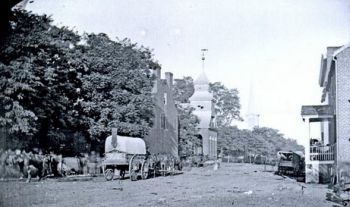In northern Virginia near Warrenton on September 13, 1863 in the Battle of Culpeper Court House, the Union Army of the Potomac defeated the Confederate Army of Northern Virginia, taking possession of the region of Culpeper County and securing their position in the Battle of Rappahannock Station on November 7. The victorious Army of the Potomac is now in winter quarters at Culpeper Court House.
As is typical of occupying forces, the buildings of Culpeper are utilized by the Union Army, as the Richmond Daily Dispatch notes:
Orange C. H., Jan. 10.
–Seven prisoners, captured by Mosby’s men, near Warrenton, on the 7th, were sent in here to-day. Our men captured at the same time ten horses and mules, besides the arms and equipments of those captured. The three years men in the Yankee army who re-enlist are getting a bounty ranging from $800 to $1,000 each. The enemy are using the Court-house building at Culpeper C. H., and the Baptist Church, as stables.
Following the arrival of spring, the Army of the Potomac departs Culpeper on May 4 on an offensive against General Robert E. Lee‘s Army of Northern Virginia.
Meanwhile, far to the West one of the most significant hangings of the Civil War takes place. The gold camps of Montana — Virginia City, Nevada City and Bannack being foremost — are providing roughly $1,000,000 per week of gold, money that is critical to the Union war effort. Yet lawlessness reigns in Montana territory, in no small part due to the Plummer gang, a ruthless gang of outlaws led by Bannack’s sheriff, Henry Plummer. Aided by the authority of his office, Plummer covertly disrupted the supply of gold in 1863, stealing massive amounts of the precious metal. In response, angry, anonymous citizens from Montana’s gold towns formed the Vigilantes in an effort to establish law and order.
Today, the Vigilantes capture Plummer and two of his lieutenants, hanging them at nightfall. By the end of the spring, all of Plummer’s gang members are either executed or have left the territory. The vigilante justice allows the gold to flow more freely into U.S. coffers, aiding in the funding of the war against the Confederacy.
Sources: “Culpeper County During the Civil War,” Encyclopedia of Virginia (link); Battle of Culpeper Court House (link); “From the Rapid-in,” Richmond Daily Dispatch, January 11, 1864 (link); John C. Fazio, “How the Civil War Was Won in Montana,” The Montana Pioneer (link); “Henry Plummer is Elected Sheriff of Bannack, Montana” (link); “Bannack State Park Gallows” (link); also see Ken Robison, Montana Territory and the Civil War: A Frontier Forged on the Battlefield, Charleson, SC: History Press, 2013 (link)



